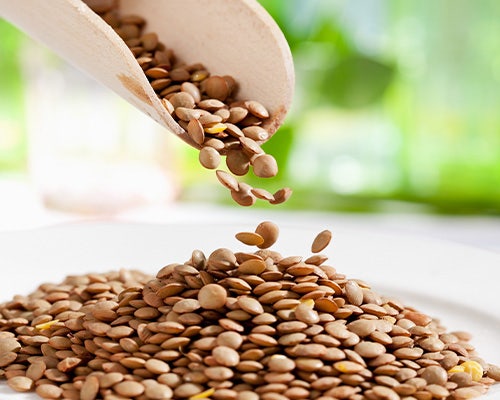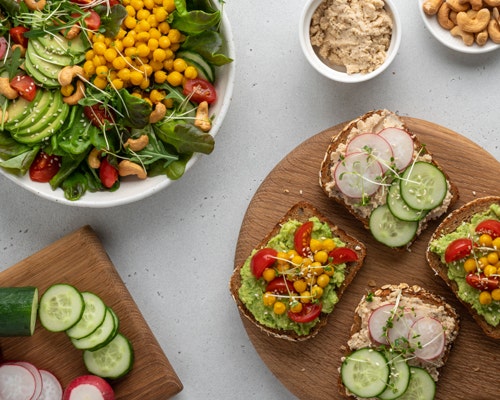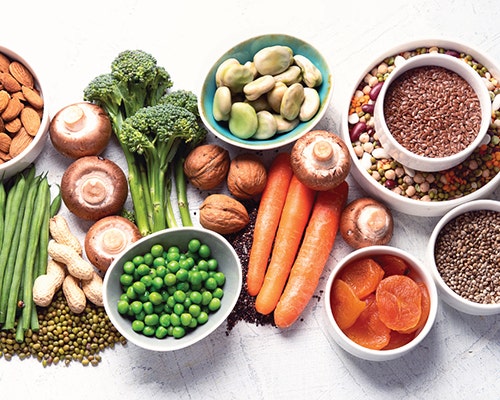From Bloating to Bliss: How These 4 Foods Help You Poop
- 7/5/23


Being constipated is extremely uncomfortable. You feel bloated, overly full, and your pants feel way too snug. While everyone experiences constipation from time to time when you are struggling to go, what can you eat that might help?
Constipation Fix: Fiber + Water
Constipation can mean different things to different people, but medically it is defined as fewer than three bowel movements per week or difficulty passing a stool when they need to go. Constipation can be chronic or something you experience only occasionally.
Diet and lifestyle play a role in how often you might experience constipation. When it comes to diet two main nutrients stand out for bowel regularity: fiber and water.
Fiber, the structural carbohydrate found in plants, adds bulk to the stool, helping it move through the digestive system. The Dietary Guidelines for Americans recommend that women get at least 22-28 grams per day and men get at least 28-34 grams.
To help fiber move through your body, it needs water. Paired together, a high-fiber diet with plenty of water should help move things along consistently.
4 Foods to Help You Poop
Here are 4 foods that are not only high in fiber and water but also contain other compounds that help keep the digestive system moving smoothly.
Broccoli
A cup of broccoli has 2.4 grams of fiber, providing around 10% of your daily needs. It also contains a substance called sulforaphane that can help support healthy bowel movements. Enjoy broccoli raw, cooked, or roasted.
Kiwi
This hairy little fruit is a great source of fiber, with around 2 grams per fruit. It also has a special enzyme called actinidine, which helps support healthy digestion. Enjoy kiwi on its own as a snack or in a fruit salad.
Apples
Apples and other similar fruits like pears, have high amounts of water and fiber, with one apple providing over 3.5 grams. Apple skin has a special type of fiber called pectin that may help speed up transit time and relieve constipation. Be sure to eat the whole apple with the skin for the most digestive benefit.
Prunes
Prunes may not be the most glamorous food to eat, but these dried plums are loaded with fiber and other nutrients such as sorbitol that help you go.
A 2019 study found that consuming between 80-120 grams of prunes per day significantly increased bowel movement frequency when compared to a placebo. One thing to note is that the prune group did have more gas, so if you want to add prunes to your routine, consider adding them in slowly.
Supporting Digestive Health
While eating a fiber-rich diet and drinking plenty of water is a great way to get things moving, there are some dietary supplements and lifestyle factors that can help as well.
If you find it difficult to eat enough high-fiber foods, a fiber supplement may be a good addition to your routine. Probiotics, like our Raw Probiotics Colon Care, can help as well.
Walking, jogging, or any exercise where you are working against gravity can help speed up transit time through the intestines.
Finally, if you are chronically struggling with constipation and it is impacting your life, it may be time to see a doctor. Certain medical conditions or medications can cause constipation, so it is best to speak to a healthcare provider if there is a more serious underlying cause.
References:
-
Forootan, M., Bagheri, N., & Darvishi, M. (2018). Chronic constipation: A review of literature. Medicine, 97(20), e10631. https://doi.org/10.1097/MD.0000000000010631
-
U.S. Department of Agriculture and U.S. Department of Health and Human Services. Dietary Guidelines for Americans, 2020-2025. 9th Edition. Available from: https://www.dietaryguidelines.gov/resources/2020-2025-dietary-guidelines-online-materials
-
FoodData Central. Broccoli, raw. Available from: https://fdc.nal.usda.gov/fdc-app.html#/food-details/747447/nutrients
-
Yanaka A. (2018). Daily intake of broccoli sprouts normalizes bowel habits in human healthy subjects. J Clin Bio Nutr, 62(1), 75–82. https://doi.org/10.3164/jcbn.17-42
-
FoodData Central. Kiwi fruit, raw. Available from: https://fdc.nal.usda.gov/fdc-app.html#/food-details/2344734/nutrients
-
Kaur L, Boland M. Influence of kiwifruit on protein digestion. Adv Food Nutr Res. 2013;68:149-67. doi: 10.1016/B978-0-12-394294-4.00008-0. PMID: 23394986.
-
FoodData Central. Apples, granny smith, with skin, raw. Available from: https://fdc.nal.usda.gov/fdc-app.html#/food-details/1750342/nutrients
-
Moslemi M. Reviewing the recent advances in application of pectin for technical and health promotion purposes: From laboratory to market. Carbohydrate Polymers. 2021, 254: 117324. doi:10.1016/j.carbpol.2020.117324
-
Lever E, Scott SM, Louis P, Emery PW, Whelan K. The effect of prunes on stool output, gut transit time and gastrointestinal microbiota: A randomised controlled trial. Clin Nutr. 2019 Feb;38(1):165-173. doi: 10.1016/j.clnu.2018.01.003. Epub 2018 Feb 15. PMID: 29398337.




